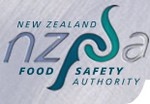Food safety for winter ills
People who are sick with winter colds and flu’s should take special care when preparing food for others, the New Zealand Food Safety Authority (NZFSA) advises.
NZFSA principal public health adviser Donald Campbell says ideally sick people should avoid preparing food for others, but when this isn’t possible there are steps that can be taken to reduce the risk of spreading infection.
“Personal hygiene is always the most important thing for anyone preparing food. Wash and dry hands thoroughly before touching food or after coughing, sneezing, blowing your nose or touching your face. Avoid coughing or sneezing over food. Turn away and cough into the inside of your elbow.
“Cook food and serve it piping hot, as cooking generally kills viruses and bacteria. If possible, have someone who isn’t sick plate up food individually rather than having everyone in the family touching shared serving spoons used in communal dishes.
“Make sure kitchen and dining surfaces are kept clean. Wash dishes in the dishwasher or with hot soapy water and dry with clean tea towels.
“If you live alone, are a single parent, or are responsible for the care of someone who is frail or disabled, you may need to call someone to help you until you are feeling better.
“Plan ahead. Think of someone who could help you with food and other supplies if you and your family were sick and could not leave the house.”
Emergency food supplies are useful to have on hand when the caregiver is too unwell to shop or if there is a need to quarantine a family who may have been exposed to the A(H1N1) influenza (‘swine” flu) virus.
“It is important to regularly restock and refresh your emergency food supplies. Check use-by dates and make sure cans and packaging are not damaged or rusty. Throw away any item that is not in good condition,” Donald Campbell said.
